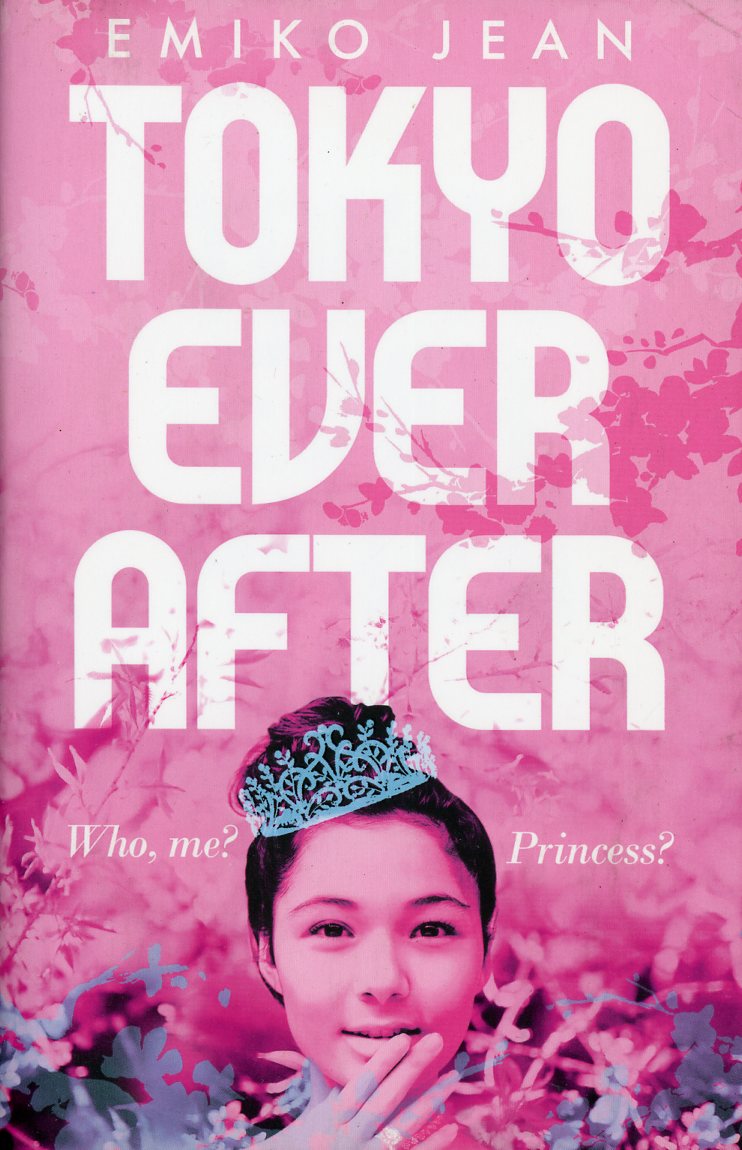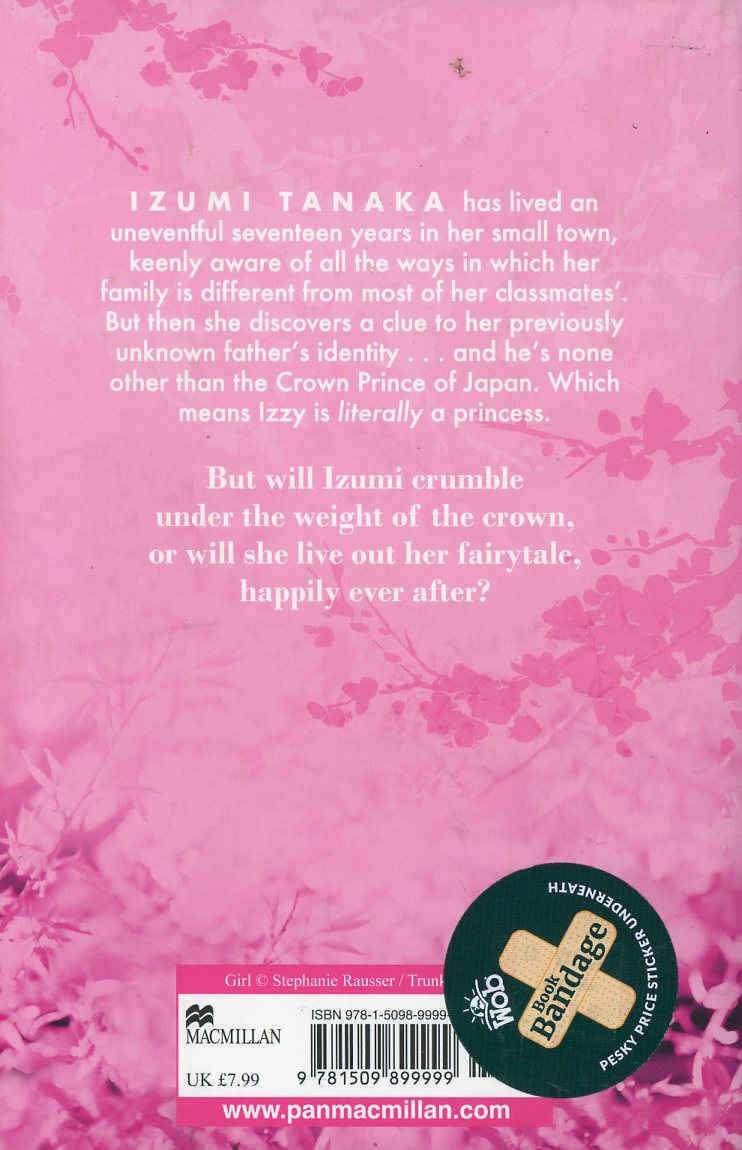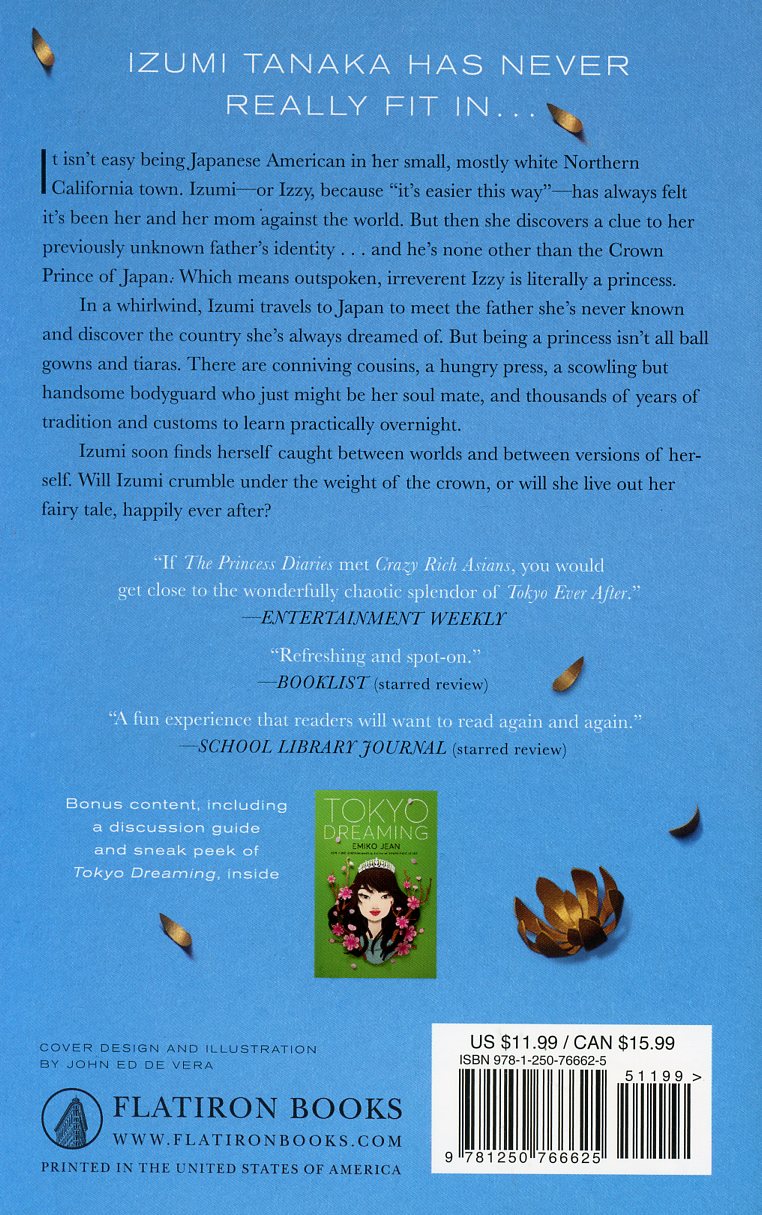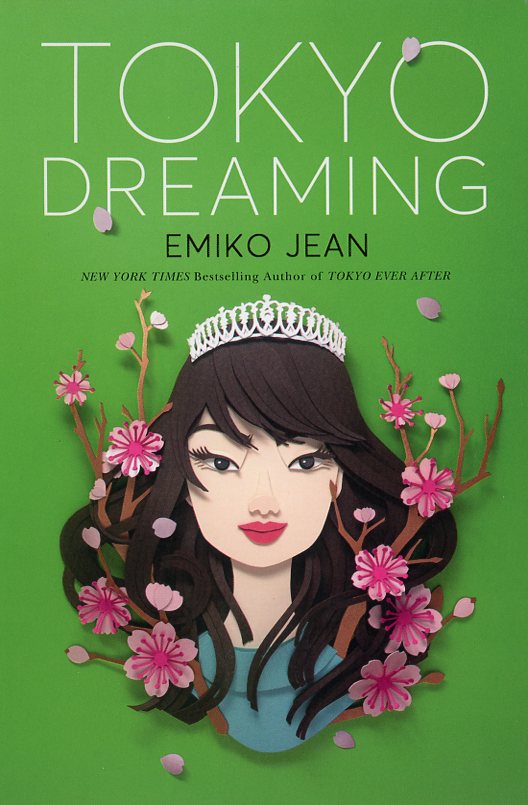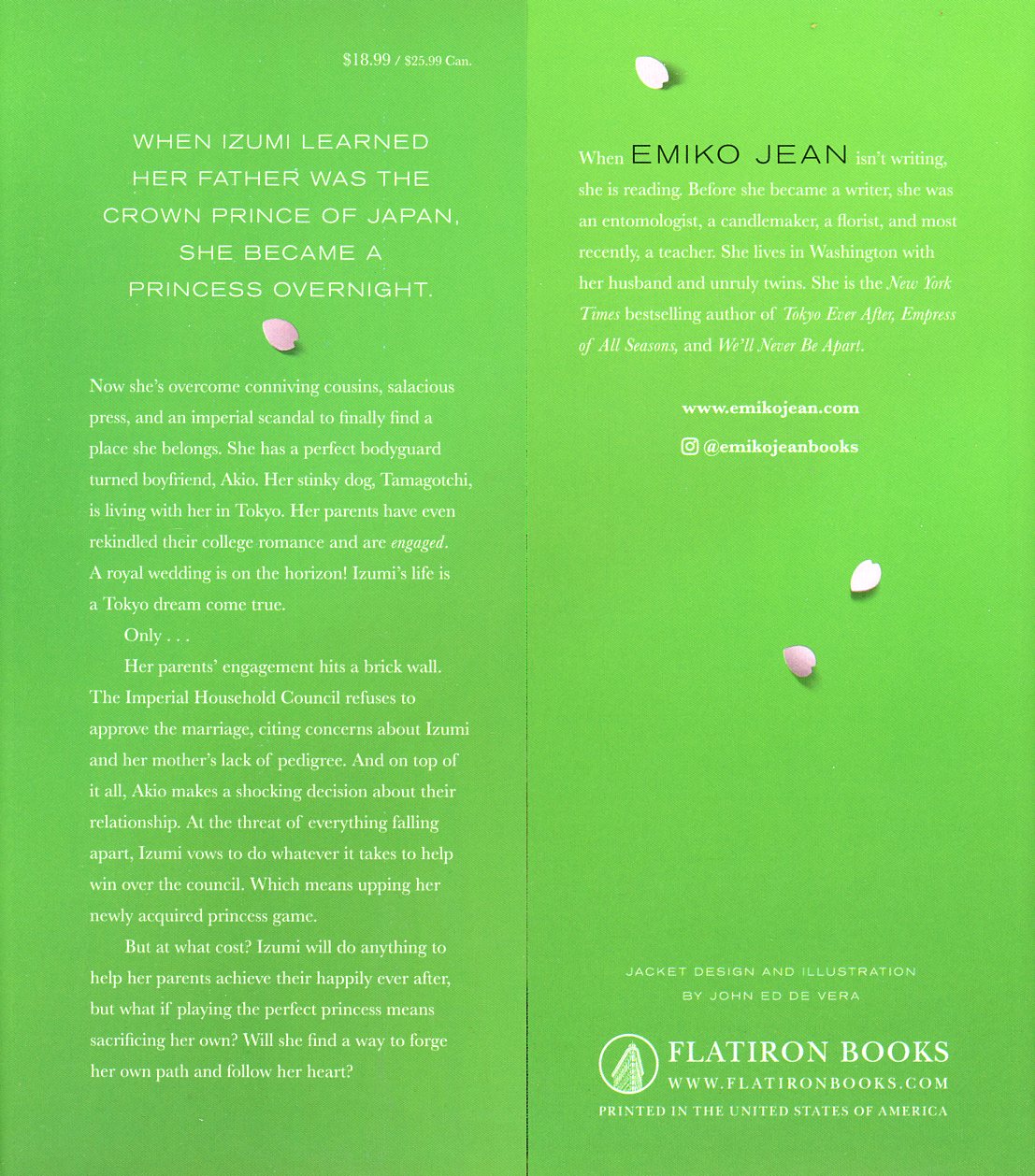Tokyo Ever After Dreaming
The Crown Prince's love child ferries a tale across the Pacific
By William Wetherall
First posted 27 June 2023
Last updated 30 June 2023
Emiko Jean Emiko Jean The writing targets "young adults", meaning teenage girls who can read. As a work of juvenile chick lit, the reading doesn't get much lighter, and doesn't move at a faster pace. One of the log lines has been "If The Princess Diaries met Crazy Rich Asians, you would get close to the wonderfully chaotic splendor of Tokyo Ever After" (Entertainment Weekley). Both Tokyo Ever After and its sequel, Tokyo Dreaming, begin with a 2-page family tree of "The Imperial Family*" headed by "Emperor Chowa**" and "Empress Aimi**". The single asterisk (*) means "an annotated, unofficial genealogy". The two asterisks (**) mean "deceased". "The Emperor" is Takehito -- "Tenno Heika, the heavenly sovereign". "The Empress" is "Chika", a commoner. "Crown Prince Toshihito", also known as "Makotonomiya" or "Mak", is "1st in line to become emperor, the 'George Clooney of Japan'***". The three asterisks mean "pre-Amal and twins" -- an allusion to Clooney and his family. Mak's love child is "Princess Izumi" or "Izzy", the 1st-person narrator of both novels -- a student at Mount Shasta High School in northern California, where she has been raised by a single mother, Hanako Tanaka, a biology professor -- "but botany is her real jam." Izumi has no idea who her father is. Then one day, her best friend, Noora, is flipping through a book about orchids that Izumi's mother keeps at her nightstand, when she stumbles across a romantic inscription on the title page, with an erotic poem by "Yamabe no Akahito", signed "Makoto 'Mak'". Noora helps Izumi pursue Makoto's identity, and they conclude that he is Crown Prince of Japan. And Izumi sees her features in his face. Makoto is pushing 40, but unlike his younger brother, who married a famous soap opera actress and has twin daughters, appears to be a confirmed bachelor. Izumi can't wait to get to Japan and meet him and her imperial family relatives. In Japan, she needs protection from gossip reporters and other predators. And true to fads that draw fans to wannabe royal spoofs like flies on roads apples, she falls in love with her bodyguard. Plot and intentionsThe over-arching plot is familiar in a sub-genre of fiction involving discovery of royal, aristocratic, or otherwise classy blood in one's veins, the result of clandestine and hushed affairs. Izumi's pursuit of her father becomes an adventure story set in another place -- a small-town California girl thrust into the jungle of the biggest city of another country -- Japan. Japan, though, is not just another country for the author, Emiko Jean, who admits that she was "interested in exploring the Japanese American identity" and herself in high school. The books she read didn't have Japanese American protagonists, and she wanted to put herself in a story she liked. Emiko Jean says in an interview with Katharine McGee (b1988) -- a writer of young adult science fiction, romance, and alternative history novels, including titles like American Royals (2019) and Majesty (2020) -- that Izumi's identity struggle very much mirrors her own growing up, then makes this remark about her own identity (Tokyo Ever After: An Evening with Emiko Jean and Katharine McGee (Books & Books, YouTube, from 14:18-14:50 minutes in 46:04-minute talk, transcribed 30 June 2023). I didn't really reconcile my Japanese American identity until I wrote this book. I'd always felt bifurcated, and, you know, at the end . . . it doesn't wrap up in like a pretty bow, but in the end, you know, Izumi becomes, or feels that she's a whole and complete person, and that she doesn't need that validation from Japanese people or from Americans, that she has her own agency within herself, and she feels empowered as a Japanese American. So there you have it -- phrased in lingo straight from the latest edition of "Claim yourself: The language of empowerment and self-validation". Oddly, what begins as a "bifurcated" Japanese American ends up a "whole and complete" Japanese American. Maybe Emiko Jean would write the first label "Japanese-American" (hyphen) and the second label "Japanese American" (no hyphen). My approach to a fictional story is to entirely discount who wrote it and why. Who Emiko Jean is or thinks she is, and why she claims to have written Tokyo Every After and its sequel, should not matter. The litmus test is whether her stories are readable and entertaining as escapes from reality. Both novels satisfy these criteria for escape fiction. Neither has much to do with the "real" Japan or the "real" members of its much fabled and gossiped about imperial family -- though both are more interesting. Discussion questionsSome qualities of Izumi's (Emiko Jean's) "identity struggle" are real enough, but the theme is over exposed -- too obvious -- for the novels to qualify as non-didactic literature. They reek of narcissistic self-awareness, though Emiko Jean has a way of making Izumi's quest for her real self humorous. Tokyo After Dark's "identity struggle" niche is confirmed by the "Discussion Questions" for reading groups that appear in the back of the "Reese's YA Book Club" edition (blue cover). Question 7 poses this problem ([brackets] mine). Izumi asks Noora, "Don't you ever feel like you don't belong anywhere? Like you're two discordant halves living in one body?" Her best friend responds, "We all have to figure out on our own who we are and were we fit in." How, if at all, does Izumi figure that out?" My guess is that only Emiko Jean knows the answer. Emiko Jean's other titlesEmpress of All Seasons (2018) is not a prequel but a finger exercise in the fantasy genre. The protagonist, Mari, is a "yōkai" who dreams of marrying the prince and grooms herself to be his empress when he becomes the emperor of Japan. However, members of the imperial family, as humans, are not permitted to marry supernaturals like Mari, who has the ability to transform herself into a monster. So she has a lot of scheming to do to make her dream come true, beginning with the need to hide her identity. In the meantime, Price Taro does does not want to the emperor. And Akira, a half-human, half-yōkai outcast, has his own irons in the fire. Emiko Jean's debut novel, We'll Never Be Apart (2016), mercifully does not involve Japan or things Japanese. Emiko Jean's only adult novel, Mika in Real Life, released on 9 August 2022, is not about Japan either, but it features 35-year-old Mika Suzuki, who one day gets a call from Penny, the daughter she gave up for adoption 16 years ago -- and she ends up falling in love with Thomas Calvin, Penny's adoptive widower father. Emiko Jean who?I suspected that "Emiko Jean" was either not the author's name, or only part of it. "Emiko Jean" smacks of a first and middle name, or a double first name. In a 10 June 2022 interview titled "Emiko Jean's Labor of Love " with Jen Doll at Publishers Weekley, Emiko Jean said that she was 40 years old, had grown up "in a mostly suburban white neighborhood, in Beaverton, which is right outside of Portland, and my mom was a reading specialist . . . My dad was a principal. They were educators. They were readers." Emiko Jean has also said in profiles and interviews that she "lives in Washington with her husband and children". These two fuzzy factoids appear to equate her with Emiko Jean Matsunaga, who married Craig Thomas Coughlin in Multanomah county, Oregon, on 20 August 2006, and thereby became Emiko Jean Coughlin. Emiko Jean's website at www.emikojean.com reflects the playful imagination that characterizes her writing. |
||||||||
